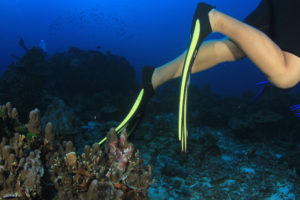According to the WWF, 60 percent of the world’s population — more people than inhabited the entire planet in 1960 — live within 37 miles, or (60 km) of the coast. On top of this, 80 percent of all tourism — including that scuba diving trip — takes place in coastal areas, with beaches and coral reefs among the most popular destinations. With the human population projected to reach more than 9 billion by 2050, there will be a massive amount of pressure on the ocean and its coastal areas.
While being environmentally conscious is much easier than it used to be, the oceans now face more threats than ever before, from over-population and acidification to escalating marine debris and global warming. But it’s not all bad news. Worldwide, scuba shops are pushing ahead on conservation and the dive industry is rethinking how it operates. With today’s advances, you can still go on vacation and be a good ocean steward. Start here with our eight eco-tips for your next scuba diving trip.
Be a conscious shopper
Sustainability starts before you leave the house. Today’s technological advancements give us a world of options when shopping for new gear and clothing. Put the planet first and seek out items that were manufactured using ethical materials and avoid businesses that use harmful practices. We all love shiny new gear but — as hard as it is — try to buy only what you need. You can carry conscious shopping over to your dive trip by avoiding questionable shops and souvenirs, like gifts made of shells and marine mollusks.
Choose a green operator
Much like weighing your options in the mask aisle, take time to weight your options on dive shops. Be a stronger ocean advocate by aligning yourself with a business that has a strong eco-commitment. Educate yourself on modern sustainable practices so you can make an informed choice before your trip. This article will help you become an environmental detective and zero in on the best operator for your next dive.
Plan ahead
Once you’re on the dive trip the course is set. Think back on your last holiday — what everyday items did you need? Try to bring them from home and plan ahead so you can opt out of receiving polluting plastic or styrofoam. Small packable kitchen kits fit easily in a backpack and go well alongside a reusable water bottle and lightweight grocery bag. Don’t forget biodegradable dish detergent to wash it with. This is another small effort that will make a big difference.
Consider carbon
Flights produce greenhouse gases and the world’s carbon emissions are on the rise. Whether you’re a local or international vacationer, consider the distance you will travel and how you can off-set your carbon footprint. If traveling short-haul, choose alternative transportation over heavy-polluting flights. For long haul, opt for more efficient direct flights as take-off and landing produce the most emissions. Also consider counterbalancing your emissions by donating to a carbon off-set scheme provided by your airline, volunteering at a marine park at your destination, or having a few meat and fish-free days.
Go chemical-free
Don’t contaminate the ocean. As divers, we are in and out of the water all day and products easily wash off your body and clothing, spreading harmful, unfiltered chemicals. Go natural by avoiding sunscreens, make-up, detergents, and destructive substances. Cover up and avoid the sun or, if going natural isn’t possible, bring safe and ethical products on your trip.
Police pollution
Police pollution by being conscious of your waste and collecting trash during your trip. Request items with minimal packaging and put your rubbish into a lidded trash or recycle bin. No recycling? Bring it home so you can dispose of it correctly. Even today, many places don’t have access to a recycling center. Candy wrappers, plastic bottles, cigarette butts, and old batteries are some of the biggest culprits. Project AWARE has made it easy to police pollution by providing a free survey toolkit that is available for download. Do your part.
Become a disciplined diver

Diving can be destructive to the ecosystem by stirring up sediments and damaging corals. You may think one person can’t do much harm. But when 1,700,000 scuba divers take vacations every year, their compounded effects make dramatic changes. Curtail your own impact by streamlining buoyancy, controlling your movements, weighting correctly, and keeping those fins off the reef. Buoyancy and photography classes are good options to further hone your skills.
Don’t touch anything
Sometimes we need a little reminder. As the old adage says, “take only pictures and leave only bubbles.” Avoid touching coral and reaching out for marine life and encourage others to do the same by setting a good example. Every fish, creature, and human in the ocean plays a vital part in the delicate balance. The biggest effect you can have is to leave the dive site exactly as you found it.
So, there you have it — eight real-world tips that will help make your scuba diving trip far more sustainable. Now it’s your turn — where will you begin?
Rachel Huber is a dive instructor and freelance writer based in Squamish, Canada. After a decade living a pirate’s life in the Caribbean, she moved home where she now writes primarily on travel and liveaboard diving. Her passion for scuba continues to take her all over the world seeking her next great story, and a whale shark or two. Visit her website or find her on Instagram.

